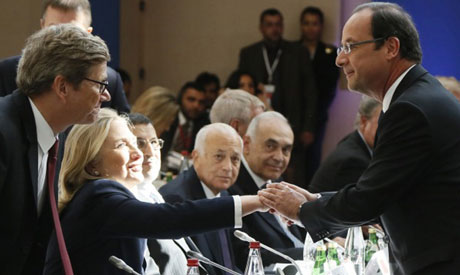
France's President Francois Hollande (R) shakes hands with U.S. Secretary of State Hillary Clinton (2nd L), as German Foreign Minister Guido Westerwelle (L) looks on, during the third meeting of the "Friends of Syria" group in Paris July 6, 2012. (Photo: Reuters)
France and the United States pushed for tougher sanctions on Syria at an international conference of some 100 countries Friday as a top general with close ties to President Bashar al-Assad defected.
General Munaf Tlass, the son of a former defence minister, has become the highest-ranking military officer to have abandoned the Syrian regime, spurring Western hopes of an exodus of top brass.
The 16-month uprising against Assad's regime in which over an estimated 16,500 people have died is now a threat to international security, French President Francois Hollande said, echoing US calls for stronger UN sanctions.
"It is no longer debatable that this crisis has become a threat to international peace and security," Hollande told the Friends of Syria meeting which has been boycotted by Syria allies and UN veto wielders Russia and China.
"So we have to draw the conclusions. Bashar al-Assad must go. A government of transition must be created. It's in everyone's interests.
"To those who maintain also that Bashar al-Assad's regime, as dislikeable as it is, can avoid chaos, I tell them that they will have both the most dislikeable regime and chaos. And this chaos will threaten their interests."
Russia, whose only Mediterranean naval port is in Syria, has twice blocked UN Security Council action on the Syrian conflict.
Hollande called on participants to "encourage the UN Security Council to take measures as quickly as possible to support the plan to end the crisis."
The Paris meeting follows a gathering in Tunis and another in Istanbul, both of which called in vain for tougher action against Assad's government.
China did not attend either of those meetings in which the United States, France, Britain, Germany as well as Saudi Arabia and Qatar led a group of more than 60 members, including most EU states and many Arab League nations.
UN Security Council members the United States and France are leading calls for tough new UN sanctions to be imposed on Assad and his inner circle.
Speaking as US Secretary of State Hillary Clinton flew to Paris for the meeting, one US official said it was time "to put this all together under a Security Council resolution that increases the pressure on Assad, including having real consequences," such as economic sanctions.
"We, and we believe most of the countries represented in Paris, think that has to include Chapter 7 economic sanctions on Assad," said the official aboard Clinton's plane who requested anonymity, referring to a clause within the UN charter.
"Many of the countries in Paris already have those sanctions but globalising them will be very important. That is the argument that we will continue to make to Russia and China."
Chapter 7 of the UN charter, which allows for sanctions ranging from economic measures to an arms embargo, and if necessary military force, was last used against Libya in 2011. But it could be highly controversial at the UN Security Council, given Russia and China's veto powers.
"Violence is still rampant, massacres are being perpetrated and they must be stopped," said Arab League Secretary General Nabil al-Arabi.
"This conference must show clear, effective support. A simple declaration of intent is not enough. We need to force the Security Council to adopt a resolution to put an end to this tragedy."
China backed Russia at talks in Geneva last weekend, insisting Syrians must decide how the transition should occur, rather than allowing others to dictate their fate.
The West insists that Assad should not be part of any new unity government and the Syrian opposition rejected the Geneva talks as making concessions to Damascus under pressure from Russia.
Russian Foreign Minister Sergei Lavrov confirmed on Thursday that Western nations had asked Moscow to offer Assad asylum and that Russia had thought it was a joke.
The diplomatic source nevertheless insisted that "Russian political and security circles are changing their position, they agree that the situation is deteriorating... even if they continue to defend Moscow's policies."
The head of the main opposition Syrian National Council on Friday called for humanitarian corridors and a no-fly zone to be implemented.
"All steps have to be taken to establish a humanitarian corridor and a no-fly zone," Abdel Basset Sayda said, claiming that Assad's regime "is about to fall."
Monzer Makhous, the opposition SNC's Europe coordinator, said: "If 100 countries say they want Assad to go that's real progress. The Syrian regime feels protected by the Russians and the status quo."
Short link: